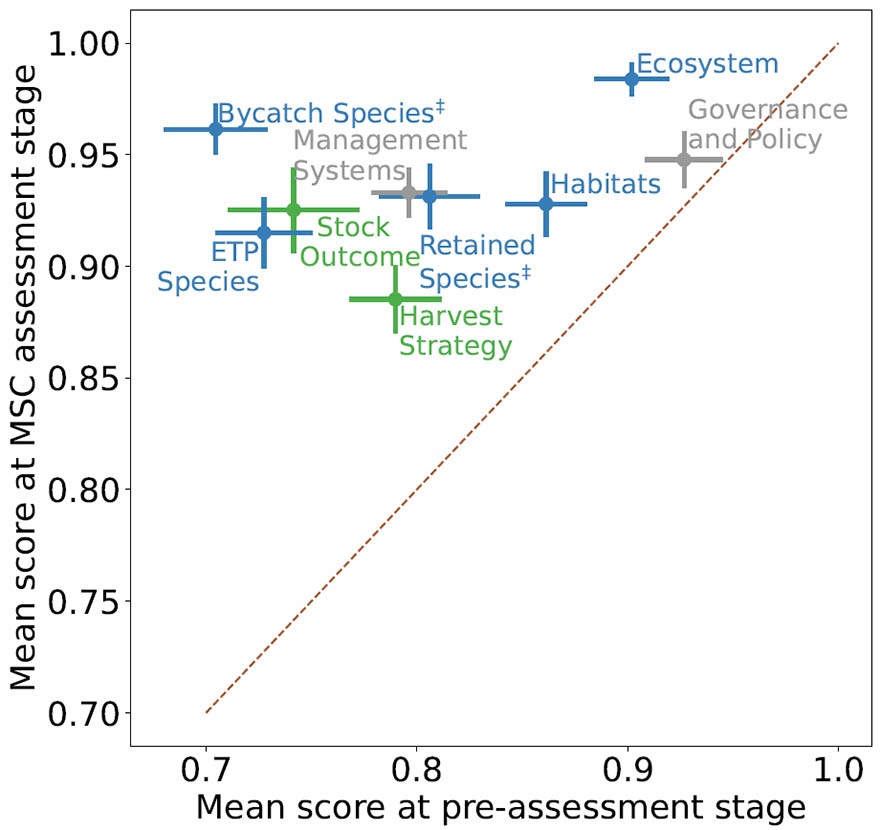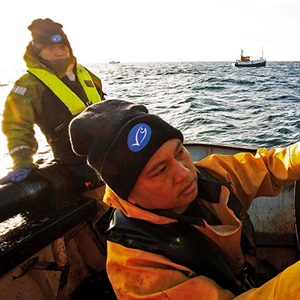By Ritu Singh
6 February 2024
A new peer-reviewed paper by MSC researchers sheds light on the factors and incentives that drive improvements in fisheries seeking to achieve certification to the MSC’s Fisheries Standard.
The research suggests strong national management capacity and market demand for certified catch are important drivers of successful and rapid certification.
Additionally, findings show that fisheries with strong management have better chances of overcoming unfavourable economic circumstances and improving their practices prior to certification.
The paper, published in leading marine science journal Fish and Fisheries, analyses the progress of fisheries from pre-assessment to full assessment against the MSC Fisheries Standard. A pre-assessment is a rapid version of assessment used to identify performance gaps a fishery needs to address to become certified as sustainable.

Scatterplot showing the mean Benchmarking and Tracking (BMT) index of individual Fisheries Standard components, from the pre-assessment versus MSC certification. Horizontal and vertical error bars reflect 95% confidence intervals. Dashed line shows, for each score measured at pre-assessment, the score it would have once certified if nothing had changed. Any scores above the dashed line have increased at the certification stage. Green -Principle 1 components, blue - Principle 2 components, grey - Principle 3 components.
A comprehensive review of assessments
Lead author Jennifer Rasal and colleagues spent five years compiling pre-assessment scores from public and private sources. The data were mined from 259 MSC pre-assessment reports, spanning fifteen years (1997 to 2019) and cover 208 fisheries from 102 countries, targeting 316 species, and using 62 gear types.
This open access pre-assessment dataset is the most comprehensive record of fishery performance scores from MSC pre-assessments. When combined with existing data from certification reports from formal MSC assessments, it provides an unprecedented set of 'before' and 'after' scores.
Combining scores made it possible determine the factors that drive successful certification and explore changes in performance on all three of the Standard’s sustainability principles: 1. Sustainable stocks, 2. minimising environmental impacts and 3. Effective management.
The drivers of sustainable certification
The research team found that important drivers for speedy and successful certification are good national fisheries management and market demand for MSC certified seafood.
When the proportion of global catch of a target species that is already MSC certified increases towards 15%, the probability of successful certification also increases.
This supports the MSC’s Theory of Change, which posits that market demand is important for improving the seafood sector's sustainability and, through benefits to seafood industry partners, incentivises positive environmental outcomes.
It also suggests that where fisheries are incentivised to make improvements to gain access to markets, good governance enables some to overcome initial disadvantages in the pre-assessment stage.
Certification driving improvements across the board
It has been suggested that fisheries that gain MSC certification are often already sustainable.
One implication of this theory is that improvement is not driven by the process of certification. However, the data appear to contradict this. 96% Units of Assessment (covering the target stock(s), fishing methods, fishers, and vessels) showed improvements in at least one of the Standard’s performance indicators between pre-assessment and certification.
On average, if we compare fisheries that were eventually certified to their performance at the pre-assessment stage, they improved their scores for all three principles of the Fisheries Standard.



